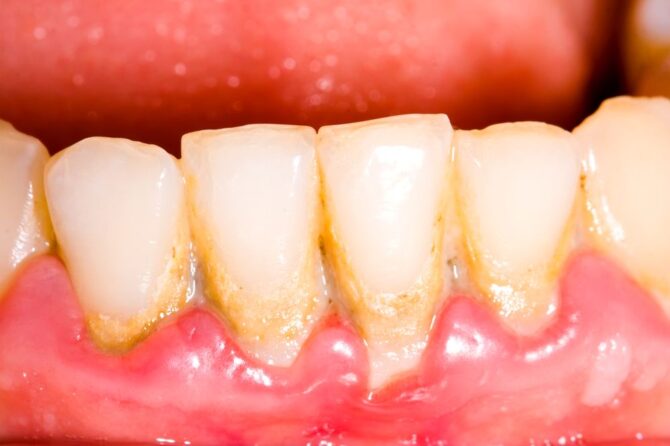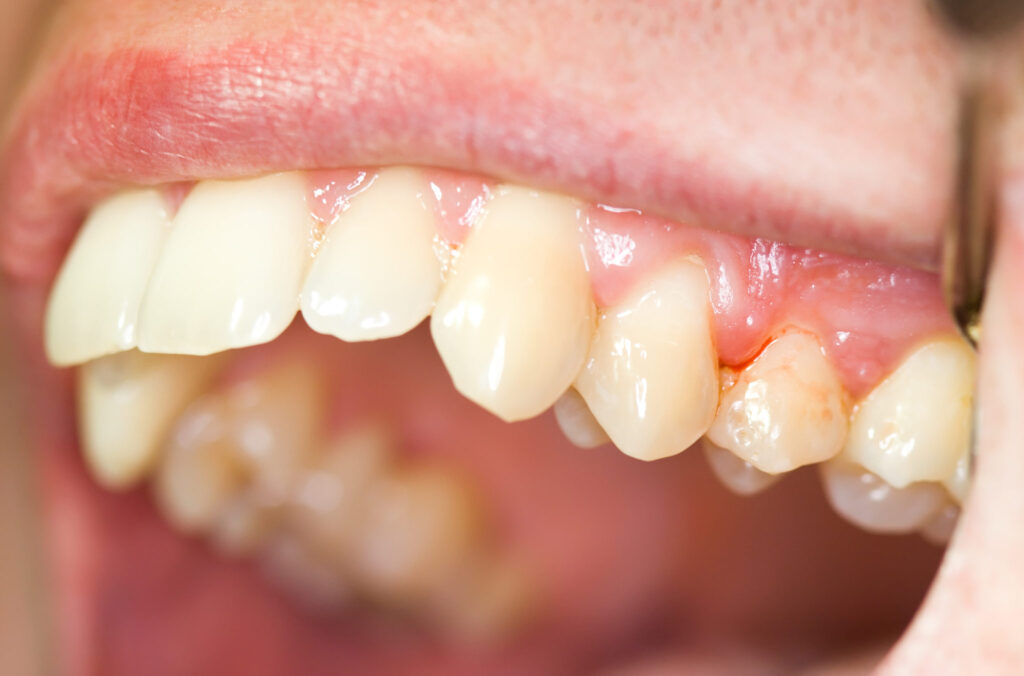
Fight Gum Disease & Regrow Gums Naturally with Diet & Oral Care
Gum disease is a real threat to your overall oral health. It can cause pain, redness and inflammation of the gum tissue. While mild cases of gum recession can be managed with proper oral hygiene, severe cases may require professional treatment, such as surgery. Fortunately, there are natural ways to encourage healthy, strong gums and regrow gums naturally. In this guide, we’ll explore the causes and symptoms of gum disease, provide diet and nutrition tips to help encourage gum growth, discuss alternative treatments, suggest preventative strategies, answer common questions, and provide a summary of the information presented. Gum disease, or periodontal disease, is caused by an accumulation of plaque buildup and bacteria in the gum tissue. When left untreated, the bacteria will cause inflammation, leading to receding gums, bad breath and yellowing of the teeth. It’s important to take action to stop the progression of the disease and to start promoting healthy gum growth. The good news is that through proper oral hygiene, dietary changes and natural remedies, it is possible to support the regrowing of healthy gums. From identifying the warning signs and learning about gum-regrowth methods to understanding proper preventative practices, this guide will provide you with helpful advice and resources to achieve healthier gums.
Understanding Gum Disease
Gum recession, or gingival recession, is a common oral health problem that affects millions of people around the world. This condition occurs when the gum tissue that surrounds the teeth begins to recede or pull away from the crown of the tooth. In some cases, the recession can be so severe that the root of the tooth becomes exposed.
Gum recession can have many causes, including dental trauma, aggressive tooth brushing, hormonal changes, smoking, and periodontal disease. That’s why it is important to identify the warning signs early in order to begin taking the steps needed to reverse the process. Here are a few common signs and symptoms of gum recession:
- Sensitivity to hot or cold temperatures
- Red or swollen gums
- Bleeding gums
- Receding gums
- Loose teeth
- Halitosis (bad breath)
If you recognize any of these symptoms, it is important to seek treatment right away in order to prevent the condition from worsening. Your dentist can help diagnose the underlying cause of the gum recession and recommend the best course of action.

Diet & Nutrition: Encouraging Healthy and Strong Gum Tissue Regeneration
Eating a balanced and healthy diet can be beneficial to maintaining strong gum tissue. A variety of vitamins and minerals may help encourage natural gum regrowth and fight against gum disease. Vitamins C and D are important components in encouraging healthy gums, as they both play a key role in improving oral health.
Vitamin C strengthens the connective tissue cells in the gum and can be found in citrus fruits, green vegetables, and fortified breakfast cereals. Vitamin D helps the body absorb calcium and is found in some dairy products and in certain fish, like salmon and tuna. Additionally, foods rich in zinc such as nuts and seeds may also help reduce inflammation of the gums.
Eating a balanced diet that is high in dietary fiber can also help reduce gum disease. Foods such as apples, kale, Brussels sprouts, and other cruciferous vegetables are great choices. Omega-3 fatty acids, found in flaxseed, fish oil, and walnuts, can help keep your gums healthy by reducing inflammation.
In addition to dietary changes, supplement use may also be beneficial in naturally regrowing gums. Vitamin B complex supplements have been found to have an anti-inflammatory effect, which may help reduce swelling around the gum line. Additionally, taking probiotics has been found to partially reduce the risk of gum disease.
It is important to follow the directions on any supplement packaging carefully and talk to your doctor before beginning a supplement regimen. Making smart dietary and supplement choices can significantly help reduce the risk of gum disease and encourage healthy gum tissue regrowth.

Oral Care Practices: How To Encourage Healthy Gums
Good oral hygiene is an important part of maintaining healthy gums. Daily maintenance of your teeth and gums is essential for avoiding gum disease and promoting gum regeneration. This can be done through proper brushing and flossing, as well as using products that are specifically designed to help with gum health.
When it comes to brushing, it is essential to use the right technique. You should brush your teeth twice a day, or after every meal with a soft-bristled brush at a 45-degree angle. Make sure to get all the areas, including the gum line, where plaque can build up. Also, replace your toothbrush every three months to make sure it’s effective.
Flossing is just as important as brushing. Use a piece of dental floss or a flossing tool once a day to remove bacteria and food particles between teeth. This helps to reduce plaque buildup and can help to minimize the risk of gum disease.
Mouthwashes can also be helpful in reducing tooth decay and gum inflammation. Look for mouthwashes that contain natural ingredients that have been linked to improved oral health. Additionally, there are specific products designed to help promote gum health, such as electric toothbrushes and interdental cleaners.
Finally, regular visits to your dentist are essential for maintaining healthy gums. Your dentist can take a closer look at your mouth and detect signs of gum disease before they become serious. They can also recommend other products or treatments that can help with gum health.
Alternative Treatments for Healthy Gums
Gum health is an often-overlooked part of overall dental health, but it’s essential for healthy teeth and gums. If you are looking for natural and alternative treatments to help keep your gums strong and healthy, there are a few options to explore.
One of the most effective methods for encouraging healthy gum regeneration is diet and nutrition. Focusing on eating a nutrient-rich and balanced diet can help maintain healthy gums and reduce inflammation. Eating foods that contain vitamin C, omega-3 fatty acids, and zinc can help improve gum health. Taking a daily multivitamin or supplementing with specific nutrients such as vitamin D and calcium can also be beneficial.
Furthermore, lifestyle changes can play a role in gum health. Practicing stress management, avoiding smoking, reducing sugar intake, and increasing physical activity can all be helpful in maintaining gum health.
Oral hygiene is also a top priority. Proper brushing and flossing technique is just as important as the products you use. Using a soft-bristled toothbrush and fluoride toothpaste can help prevent damage and promote gum health. Additionally, using an antibacterial mouthwash can help reduce irritation and inflammation of the gums.
There are also some natural remedies that may help improve gum health. Rinsing with a saltwater solution, applying aloe vera gel to the gums, oil pulling, eating probiotic-rich foods, and drinking green tea are all steps you can take to naturally support gum health.
Making lifestyle changes is a great way to improve gum health and encourage gum regeneration, but it is always best to consult a dentist before starting any new treatments.
Preventing Gum Disease
Preventing gum disease is key to maintaining healthy gums and avoiding costly treatments in the future. Taking a proactive approach to your oral health can help reduce the risk of developing gum disease or other oral health issues. Prevention starts with good habits and practice, so here are a few tips to help you on your way:
- Brush your teeth twice daily for two minutes per session, making sure to cover all surfaces.
- Floss every day to remove any hidden food debris.
- Use an antiseptic mouthwash at least once a day for optimal dental hygiene.
- Visit your dentist regularly for checkups and cleanings.
- Eat a balanced diet that includes plenty of fruits and vegetables.
- Limit the intake of sugary drinks and snacks.
- Reduce stress through exercise and relaxation techniques.
By following these simple steps, you’ll be doing your part to maintain good oral health and prevent gum disease. Prevention is key when it comes to protecting your gums, so make sure to follow these tips and keep an eye out for any signs of trouble.
Common Questions: Natural Gum-Regrowth
Many people have questions regarding natural gums regrowth methods. We’ve answered some of the most commonly asked questions below to help you better understand the subject and the options available.
- Can gum tissue be regrown after being lost due to periodontal disease or recession?
Yes, it is possible to naturally regrow gums that are lost due to periodontal disease or receding gums. There are certain lifestyle changes and treatments that can help regenerate the gum tissue and improve the health of your mouth. - What are the benefits of regenerating gums naturally?
There are many benefits to regenerating gums naturally, such as improved overall oral health, enhanced aesthetics and a decrease in pain and discomfort from gum disease or receding gums. Additionally, natural regrowth is a much more affordable option than expensive dental treatments. - Are there any risks associated with naturally regrowing gums?
There are potential risks associated with the use of natural remedies for regrowing gums. Depending on the remedy chosen, there may be side effects or adverse reactions to consider. Always talk to your doctor before trying any treatment, and follow instructions carefully. - What are the best practices for maintaining healthy gums?
The best way to maintain healthy gums is to practice good oral hygiene. This means brushing and flossing twice daily and using a mouthwash to keep your mouth clean and free of bacterial buildup. Eating a balanced diet and avoiding tobacco products will also help to keep your gums healthy.
Outlook: Results, Risks and Conclusion
When it comes to regrowing gums naturally, there is no one-size-fits-all solution. What works for one person may not work for another, so it’s important to consider the risks associated with any treatments and make sure to research each option thoroughly.
Fortunately, there are several studies that highlight the potential benefits of using natural remedies for gum regeneration. For example, a 2018 study found that supplementing with vitamin C and E improved the gingival health of participants.
It is also important to note that depending on the severity of the gum disease, some cases may require doctors visits and a prescription medication. Therefore, it is always recommended to speak with your dentist before starting any treatment.
In conclusion, while there is no guarantee that natural treatments will be successful in regenerating gums, they are certainly worth exploring and offer a low-cost, natural alternative to more conventional methods. Taking time to understand why gum disease develops, following a healthy lifestyle, and engaging in proper daily oral care will help protect and maintain your gums for years to come.
Quick Tips for Healthy Gums
Having healthy gums is essential for a healthy mouth. Here are some quick and easy tips to help you maintain healthy gums:
- Brush your teeth twice a day.
- Floss your teeth daily.
- Visit the dentist every six months.
- Eat nutrient-rich foods like fruits, vegetables, and whole grains.
- Avoid sugary drinks and snacks.
- Avoid using tobacco products.
- Use a soft-bristled toothbrush.
- Consider taking supplements like xylitol or probiotics.
- Drink plenty of water throughout the day.
- Rinse your mouth with salt water occasionally.
By following these simple tips, it can help to improve your gum health and reduce the risk of gum disease. Additionally, make sure to speak to your doctor or dentist if you have any concerns about your oral health.
Glossary
In this guide, we have used several technical and medical terms related to the subject of naturally regrowing gums. Here is a glossary of some of the key terms you may come across:
- Gums: The soft tissues that surround, support, and protect the teeth.
- Gingival Recession: The process by which the gum tissue around the teeth starts to pull away from the teeth.
- Gingivitis: An early stage of gum disease. It is caused by bacteria that cause inflammation of the gums.
- Periodontal Disease: A serious form of gum disease that destroys the tissue and bone supporting the teeth.
- Plaque: A sticky, colorless film made up of bacteria that form on the surface of the teeth.
- Tartar: Hardened plaque on the teeth and along the gum line.
- Oral Hygiene: The practice of practicing good habits for cleaning the mouth, teeth, and gums.
By understanding these terms, you can begin to understand more about gum health and why it’s so important to take proper care of your gums.
Resources
When researching natural gum regrowth, it can be helpful to use credible sources. We have compiled a list of reputable websites, articles and studies that may be useful to those looking for more information about this topic.
- NIH Gum Disease Information
- The Role of Diet in Gingival Health
- Mayo Clinic: Treatment for Gingivitis & Periodontitis
- The American Dental Association’s Gum Regrowth Resources
- Regenerative Therapy: A Hope for Treating Periodontal Diseases
Whether you are looking for tips on preventive care or alternative treatments, these resources provide reliable insight into the subject of natural gum regrowth.
Regrowing gums naturally is an important step in maintaining optimal oral health. Our gums are a crucial part of our oral anatomy that allows us to have healthy teeth and eat comfortably. When gums start to recede or become infected, it can be extremely painful and negatively impact quality of life. Fortunately, there are several natural solutions available to help reverse the damage and regrow gums. These solutions include diet modifications, increasing oral hygiene practices, and alternative treatments. Through a combination of these methods, individuals may be able to naturally regenerate their gums. Specific diet changes, such as increasing consumption of Vitamin C, can help keep gums healthy by providing essential nutrients. Oral hygiene is also just as important as diet for keeping gums healthy; brushing your teeth twice daily, flossing, and using mouthwash all help to keep bacteria at bay and gums healthy. Additionally, incorporating alternative treatments, such as oil pulling, can help reduce inflammation and encourage healthy gum tissue regeneration. Finally, it is essential to take preventive measures to protect against gum disease. This includes regular check-ups with a dentist, quitting smoking, and avoiding activities that can irritate gums like utilizing hard toothbrushes. In conclusion, it is possible to naturally regrow gums. Through proper diet and nutrition, adopting better oral care practices, implementing alternative treatments, and preventive measures, individuals can work to restore their gums.
Frequently Asked Questions about Regrowing Gums Naturally
- Q: What is the best way to regrow gums naturally?
A: Eating healthy foods and taking supplements containing vitamins and minerals, like vitamin C and zinc, can help promote gum health and regeneration. Additionally, maintaining proper oral hygiene and using specialized products that have been designed to aid gum health can be beneficial as well. - Q: Are there any lifestyle practices that can help with regrowing gums?
A: Yes, in addition to nutrition, hydration and oral hygiene, reducing stress and promoting proper sleep patterns may also be beneficial for naturally regrowing gums. - Q: Are there any natural remedies that can be used to help regrow gums?
A: Products containing tea tree oil, aloe vera, propolis and myrrh may be beneficial for reducing inflammation and promoting healthier gums. - Q: What is the most important thing to do when trying to regrow gums naturally?
A: The most important thing to do when trying to regrow gums naturally is to practice good oral hygiene. Brushing and flossing your teeth twice a day, as well as avoiding certain unhealthy foods, is essential for maintaining gum health. - Q: Which foods are best for naturally regrowing gums?
A: Foods that are rich in calcium, vitamin C, and omega-3 fatty acids are beneficial for promoting gum health. Leafy greens, nuts, fish and low-fat dairy products are especially good for providing essential vitamins and minerals for better gum health. - Q: What signs should I look for to know if my gums are receding?
A: Signs of gingival recession can include redness, tenderness, irritation, and an increased sensitivity of the teeth and gums. If you experience these signs, please contact your dental provider for further evaluation. - Q: When should I seek help from a dental professional?
A: Visiting a dental professional is highly recommended as soon as possible if you notice any signs of gum recession or discomfort. Your dentist can provide a thorough evaluation and recommend a course of action to maintain your oral health.
